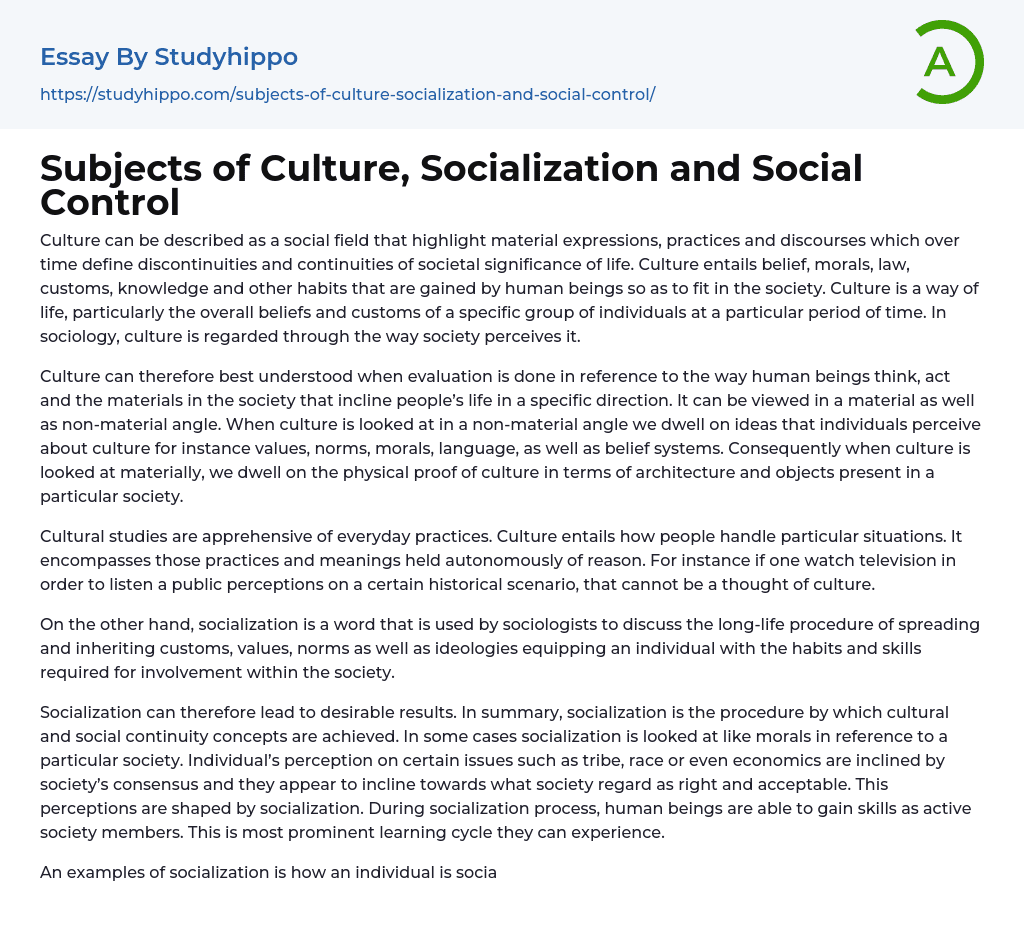

Subjects of Culture, Socialization and Social Control Essay Example
Culture refers to the social realm that encompasses tangible expressions, practices, and discourses shaping societal life's significant discontinuities and continuities. It includes beliefs, morals, laws, customs, knowledge, and other behaviors individuals acquire to conform to society. Culture represents a way of life – specifically the overarching beliefs and customs adopted by a specific group during a particular time period. Sociology understands culture through examining society's perspectives. To fully comprehend culture, one must consider how individuals think and behave as well as the physical objects and intangible aspects of society influencing people's lives in a specific direction. Both material and non-material perspectives can be used to analyze culture.
Looking at culture from a non-material standpoint, it emphasizes individuals' ideas about culture, encompassing values, norms, morals, language, and belief systems. On the other hand, when culture is approached from a m
...aterial perspective, it emphasizes observable aspects of culture like architecture and objects found in a particular society. Cultural studies investigate everyday behaviors and how people navigate specific situations while considering practices and meanings that exist beyond rationality.
For example, if an individual watches television to hear public opinions on a specific historical event, that does not constitute cultural thinking. On the other hand, socialization is a term employed by sociologists to explore the lifelong process of disseminating and inheriting customs, values, norms, and ideologies, equipping individuals with the necessary habits and skills to engage in society. Socialization can therefore yield positive outcomes. To summarize, socialization is the process through which cultural and social continuity ideas are attained.
Socialization is sometimes compared to morals within a specific society, as it influences an individual's perspective on matters such as tribe
race, and economics, aligning with society's values and deemed acceptable. Socialization shapes these perceptions, enabling individuals to acquire skills necessary for active participation in society. This process of socialization serves as the primary and prominent learning cycle for human beings.
The process of socialization involves an individual adopting a belief that a specific practice is unacceptable. For example, if honesty is emphasized within a family, children raised in such households will embrace the importance of honesty as they have been socialized to believe in it. Social control encompasses various mechanisms for regulating thoughts, behaviors, and appearance through rules, norms, laws, and social structures within society. Without social control, society would face chaos and confusion as social norms are established through methods such as laws, rules, and institutional structures.
For society to function effectively, there must be a collectively accepted social order that individuals follow in their daily lives. This order is established and maintained through social control processes involving authorities such as the police, military, and federal agencies who enforce laws. Socialization is crucial in connecting people with their culture as it introduces individuals to social norms and values, enabling them to learn about their own culture. Culture is primarily shaped through the process of socialization carried out by family members, parents, and social networks.
Consequently, socialization is an innate procedure that instructs individuals on upholding social elements. Social control and socialization are closely linked since they entail conforming to the values and norms of a particular society, which are acquired through this process. This notion fosters autonomy by enabling individuals to independently make choices and critically evaluate both their culture and the beliefs gained from socialization.
According
to C. Wright Mills, individuals can decide whether or not they want to be part of socialization and social control. Mills believes that sociology can help understand how society is responsible for human problems, and therefore it plays a crucial role in turning personal issues into public concerns.
According to Mills, even distant historical events can contribute to an individual's issues. This concept helps society differentiate between public problems and personal qualities. For example, individuals with cognitive disabilities may connect their experiences to the larger society. To adopt Mills' ideology, one must free themselves from their current circumstances and adopt a new perspective.
The Industrial Revolution transformed the living conditions of people and the geographical landscape, leading to the establishment of modern metropolis that serve as social and economic hubs. This revolution also altered the way people live and shifted the industrialized countries' geographical locations. The ongoing process of globalization brought about by the information revolution continues to impact social relationships and sociological geographies. The internet, being a major vehicle of information, has the potential to reshape demographics.
Information technology is currently revolutionizing the economy. Globalization has caused numerous industries to automate operations, substituting human labor with computer-driven programs. This alteration in job prospects has greatly influenced people's way of life. The enhanced networks that enable worldwide connectivity have simplified communication on both local and global scales, transforming the world into a unified global village. Furthermore, advancements in communication technology have compressed barriers of distance and time, enabling quicker decision-making and expanding possibilities.
Over time, there has been a notable difference in communication methods and recent technological advancements. In the past, telephones used wired connections for information transmission, but
now wireless mobile phones have been introduced, greatly improving convenience. Furthermore, computers have advanced with increased capacity and improved communication speed and safety. These developments have also led to the emergence of social media platforms, providing virtual connectivity for individuals.
- Anthropology essays
- Audience essays
- Charity essays
- Cultural Competence essays
- Emile Durkheim essays
- Gender Roles essays
- Generation essays
- Globalization essays
- Interpersonal Relationship essays
- People essays
- Race essays
- Social Change essays
- Social Class essays
- Social Movement essays
- Social Science essays
- Social Status essays
- Social Stratification essays
- Society essays
- Sociological Imagination essays
- Sociological Perspective essays
- Sociological Theories essays
- Stereotypes essays
- Web Dubois essays



